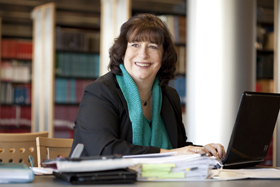Impacts of Giving
Student researches communication gaps during health-care transitions

Laura Jones conducts thesis research on care transitions.
Editor's note: This story was first published in spring 2012. As of June 2012, Jones is an inaugural graduate of the School of Nursing.
Once, while working as a nurse for a home-care agency, Laura Jones arrived at a home only to discover five different care providers present to assist the couple who lived there. None of the caregivers knew the others planned to be there, and they were not fully versed on each other’s roles. The health-care providers convened an impromptu meeting to bring each other up to speed. For Jones, the situation provided just one more example of the disconnected, inefficient approach that characterizes so much of the health-care system.
Jones witnessed many such instances of duplicative and fragmented care during her more than three decades as a nurse. She saw individuals fail to understand changes that health-care providers made to their medications or their care plans during a health-care transition—a move from one care environment, such as from hospital to rehabilitation center or home. The communication gaps between people and their health-care providers—or among different health-care providers—sometimes led to errors or inferior health outcomes, according to Jones.
“The part of health care that has always bothered me is the disconnections, the silos,” Jones said. She repeatedly asked herself, “How in the world do we get people to talk to each other across the continuum of care?”
Now, as a master’s-degree student at the Betty Irene Moore School of Nursing, Jones is working to address that important question. She examines the role of electronic community health records in bridging the communication gaps that may occur when older adults who are living with chronic conditions move from one care environment to another. Her research looks at the utility of a Web-based software tool in facilitating communication and coordination among older adults’ various health-care providers, and in enabling them to be more involved in their health care.
“My passion is centered on finding a way for health-care providers to better connect to each other and also getting people to own their care plan,” Jones explained.
The software tool allows all of a person’s relevant health-care providers—including family members, home-health providers, nurses, doctors and others—to access, share and update key health-related information on a centralized, secure, Web-based system. The tool tracks medications, health conditions, health-care providers’ contact information, and outcomes from health-care meetings and appointments. Care providers can correspond with each other in privacy, and individuals can articulate health goals and log their progress.
“My passion is centered on finding a way for health-care providers to better connect to each other and also getting people to own their care plan."
—Master's-degree student Laura Jones
When no such system is in place, it often falls on the person being treated to share information between health-care providers, creating many opportunities for confusion and mistakes, Jones said.
Jones was a consultant in the development of the tool, contributing her decades of nursing experience and her observations of communication breakdowns during care transitions.
For her master’s thesis, Jones is collecting input from health-care providers in diverse settings and the people they treat regarding the communication gaps they have seen or experienced, to gauge the tool’s usefulness and explore possible enhancements. She hopes her research will lead to improved coordination among health-care providers, and improved health among the people they treat.
“We keep doing the same thing over and over and getting the same results,” Jones said of the current health-care system. “I know we can do better.”
Philanthropy has enabled Jones to pursue her graduate education and delve more deeply into her research project. In addition to financial support through the Gordon and Betty Moore Foundation’s founding grant to establish the School of Nursing, Jones received the Constant M. and Tempest B. van Vlierden Scholarship in Nursing and the Senior Citizens of Davis Award. Receiving a scholarship is a heartening and confidence-building endorsement of her research, Jones said.
“It’s very uplifting,” she said.
The School of Nursing, with its emphasis on interprofessional education, is an excellent fit for Jones, who herself has a vision of transdisciplinary care.
“I want to teach someday, and I’ll want my future students to think outside the box.”





